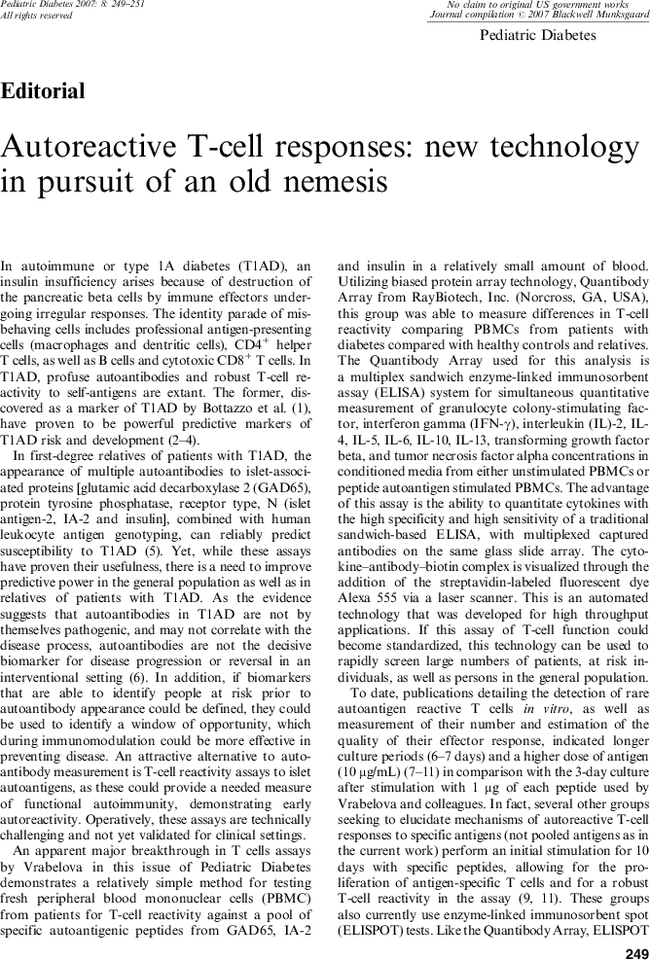Autoreactive T-cell responses: new technology in pursuit of an old nemesis
Jon D Piganelli,
Clayton E Mathews,
Jon D Piganelli
Department of Pediatrics, Children’s Hospital ofPittsburgh, University of Pittsburgh, Pittsburgh,PA15213-3205, USA [email protected]
Search for more papers by this authorClayton E Mathews
Department of Pediatrics, Children’s Hospital ofPittsburgh, University of Pittsburgh, Pittsburgh,PA15213-3205, USA [email protected]
Search for more papers by this authorJon D Piganelli,
Clayton E Mathews,
Jon D Piganelli
Department of Pediatrics, Children’s Hospital ofPittsburgh, University of Pittsburgh, Pittsburgh,PA15213-3205, USA [email protected]
Search for more papers by this authorClayton E Mathews
Department of Pediatrics, Children’s Hospital ofPittsburgh, University of Pittsburgh, Pittsburgh,PA15213-3205, USA [email protected]
Search for more papers by this author
References
- 1 Bottazzo GF, Florin-Christensen A, Doniach D. Islet-cell antibodies in diabetes mellitus with autoimmune polyendocrine deficiencies. Lancet 1974: 2: 1279–1283.
- 2 Pietropaolo M, Yu S, Libman IM et al. Cytoplasmic islet cell antibodies remain valuable in defining risk of progression to type 1 diabetes in subjects with other islet autoantibodies. Pediatr Diabetes 2005: 6: 184–192.
- 3 Riley WJ, Maclaren NK, Krischer J et al. A prospective study of the development of diabetes in relatives of patients with insulin-dependent diabetes. N Engl J Med 1990: 323: 1167–1172.
- 4 Schatz D, Krischer J, Horne G et al. Islet cell antibodies predict insulin-dependent diabetes in United States school age children as powerfully as in unaffected relatives. J Clin Invest 1994: 93: 2403–2407.
- 5 Pietropaolo M, Becker DJ, LaPorte RE et al. Progression to insulin-requiring diabetes in seronegative prediabetic subjects: the role of two HLA-DQ high-risk haplotypes. Diabetologia 2002: 45: 66–76.
- 6 Wilson SB, Kent SC, Patton KT et al. Extreme Th1 bias of invariant Valpha24JalphaQ T cells in type 1 diabetes. Nature 1998: 391: 177–181.
- 7 Kotani R, Nagata M, Moriyama H et al. Detection of GAD65-reactive T-Cells in type 1 diabetes by immunoglobulin-free ELISPOT assays. Diabetes Care 2002: 25: 1390–1397.
- 8 Peakman M, Tree TI, Endl J, Van Endert P, Atkinson MA, Roep BO. Characterization of preparations of GAD65, proinsulin, and the islet tyrosine phosphatase IA-2 for use in detection of autoreactive T-cells in type 1 diabetes: report of phase II of the Second International Immunology of Diabetes Society Workshop for Standardization of T-cell assays in type 1 diabetes. Diabetes 2001: 50: 1749–1754.
- 9 Reijonen H, Mallone R, Heninger AK et al. GAD65-specific CD4+ T-cells with high antigen avidity are prevalent in peripheral blood of patients with type 1 diabetes. Diabetes 2004: 53: 1987–1994.
- 10 Roep BO, Atkinson MA, Van Endert PM, Gottlieb PA, Wilson SB, Sachs JA. Autoreactive T cell responses in insulin-dependent (Type 1) diabetes mellitus. Report of the first international workshop for standardization of T cell assays. J Autoimmun 1999: 13: 267–282.
- 11 Schloot NC, Meierhoff G, Karlsson Faresjo M et al. Comparison of cytokine ELISpot assay formats for the detection of islet antigen autoreactive T cells. Report of the third immunology of diabetes society T-cell workshop. J Autoimmun 2003: 21: 365–376.




